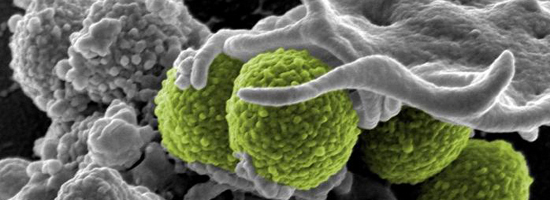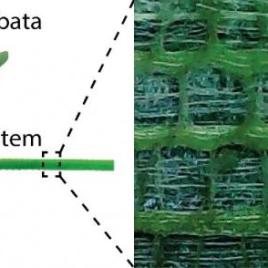
Staphylococcus aureus bacteria (green) interacting with a human immune cell. This study shows that in conditions like toxic shock syndrome, toxins from such bacteria can trigger one type of immune cells (MAIT cells) to turn against the host. (Image via NIAID)
A certain type of immune cell, which normally helps the body recover by fighting off infection, can bring about a disproportionately aggressive response and do more damage than the original pathogens. Such is the case with toxic shock syndrome, which is not brought about directly by bacteria or toxins, but rather by inflammation triggered by the immune system to fight those pathogens. Researchers have identified a subpopulation of cells in the immune system that trigger this overzealous response: mucosa-associated invariant T (MAIT) cells. Researchers found that as MAIT cells responded to toxins, they also failed to participate in the antimicrobial defense, effectively suppressing the immune response. This can also have fatal consequences due to increased susceptibility to secondary infections. Study authors propose a development of therapies to target MAIT cell response in order to ensure a proper immune response.
Authors:
Christopher R. Shaler, Joshua Choi, Patrick T. Rudak, Arash Memarnejadian, Peter A. Szabo, Mauro E. Tun-Abraham, Jamie Rossjohn, Alexandra J. Corbett, James McCluskey, John K. McCormick, Olivier Lantz, Roberto Hernandez-Alejandro, S.M. Mansour Haeryfar
Corresponding author:
Dr. Mansour Haeryfar, Schulich School of Medicine & Dentistry, Western University, London, ON, Email: Mansour.Haeryfar@schulich.uwo.ca
Original paper published in PLOS Biology on June 20, 2017.


